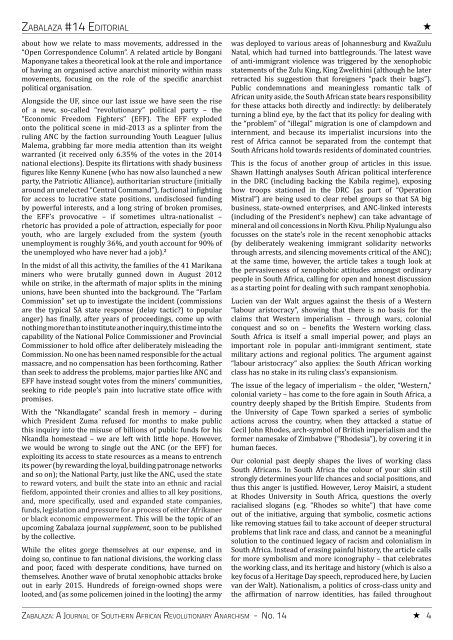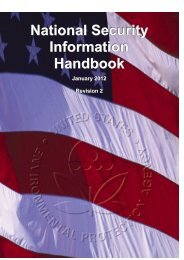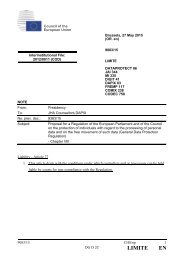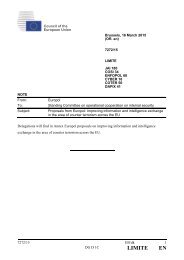[BCBMB[B
zabalaza14
zabalaza14
Create successful ePaper yourself
Turn your PDF publications into a flip-book with our unique Google optimized e-Paper software.
ZABALAZA #14 EDITORIALabout how we relate to mass movements, addressed in the“Open Correspondence Column”. A related article by BonganiMaponyane takes a theoretical look at the role and importanceof having an organised active anarchist minority within massmovements, focusing on the role of the speciic anarchistpolitical organisation.Alongside the UF, since our last issue we have seen the riseof a new, so-called “revolutionary” political party – the“Economic Freedom Fighters” (EFF). The EFF explodedonto the political scene in mid-2013 as a splinter from theruling ANC by the faction surrounding Youth Leaguer JuliusMalema, grabbing far more media attention than its weightwarranted (it received only 6.35% of the votes in the 2014national elections). Despite its lirtations with shady businessigures like Kenny Kunene (who has now also launched a newparty, the Patriotic Alliance), authoritarian structure (initiallyaround an unelected “Central Command”), factional inightingfor access to lucrative state positions, undisclosed fundingby powerful interests, and a long string of broken promises,the EFF’s provocative – if sometimes ultra-nationalist –rhetoric has provided a pole of attraction, especially for pooryouth, who are largely excluded from the system (youthunemployment is roughly 36%, and youth account for 90% ofthe unemployed who have never had a job). 2In the midst of all this activity, the families of the 41 Marikanaminers who were brutally gunned down in August 2012while on strike, in the aftermath of major splits in the miningunions, have been shunted into the background. The “FarlamCommission” set up to investigate the incident (commissionsare the typical SA state response (delay tactic?) to popularanger) has inally, after years of proceedings, come up withnothing more than to institute another inquiry, this time into thecapability of the National Police Commissioner and ProvincialCommissioner to hold ofice after deliberately misleading theCommission. No one has been named responsible for the actualmassacre, and no compensation has been forthcoming. Ratherthan seek to address the problems, major parties like ANC andEFF have instead sought votes from the miners’ communities,seeking to ride people’s pain into lucrative state ofice withpromises.With the “Nkandlagate” scandal fresh in memory – duringwhich President Zuma refused for months to make publicthis inquiry into the misuse of billions of public funds for hisNkandla homestead – we are left with little hope. However,we would be wrong to single out the ANC (or the EFF) forexploiting its access to state resources as a means to entrenchits power (by rewarding the loyal, building patronage networksand so on); the National Party, just like the ANC, used the stateto reward voters, and built the state into an ethnic and racialiefdom, appointed their cronies and allies to all key positions,and, more speciically, used and expanded state companies,funds, legislation and pressure for a process of either Afrikaneror black economic empowerment. This will be the topic of anupcoming Zabalaza journal supplement, soon to be publishedby the collective.While the elites gorge themselves at our expense, and indoing so, continue to fan national divisions, the working classand poor, faced with desperate conditions, have turned onthemselves. Another wave of brutal xenophobic attacks brokeout in early 2015. Hundreds of foreign-owned shops werelooted, and (as some policemen joined in the looting) the armywas deployed to various areas of Johannesburg and KwaZuluNatal, which had turned into battlegrounds. The latest waveof anti-immigrant violence was triggered by the xenophobicstatements of the Zulu King, King Zwelithini (although he laterretracted his suggestion that foreigners “pack their bags”).Public condemnations and meaningless romantic talk ofAfrican unity aside, the South African state bears responsibilityfor these attacks both directly and indirectly: by deliberatelyturning a blind eye, by the fact that its policy for dealing withthe “problem” of “illegal” migration is one of clampdown andinternment, and because its imperialist incursions into therest of Africa cannot be separated from the contempt thatSouth Africans hold towards residents of dominated countries.This is the focus of another group of articles in this issue.Shawn Hattingh analyses South African political interferencein the DRC (including backing the Kabila regime), exposinghow troops stationed in the DRC (as part of “OperationMistral”) are being used to clear rebel groups so that SA bigbusiness, state-owned enterprises, and ANC-linked interests(including of the President’s nephew) can take advantage ofmineral and oil concessions in North Kivu. Philip Nyalungu alsofocusses on the state’s role in the recent xenophobic attacks(by deliberately weakening immigrant solidarity networksthrough arrests, and silencing movements critical of the ANC);at the same time, however, the article takes a tough look atthe pervasiveness of xenophobic attitudes amongst ordinarypeople in South Africa, calling for open and honest discussionas a starting point for dealing with such rampant xenophobia.Lucien van der Walt argues against the thesis of a Western“labour aristocracy”, showing that there is no basis for theclaims that Western imperialism – through wars, colonialconquest and so on – beneits the Western working class.South Africa is itself a small imperial power, and plays animportant role in popular anti-immigrant sentiment, statemilitary actions and regional politics. The argument against“labour aristocracy” also applies: the South African workingclass has no stake in its ruling class’s expansionism.The issue of the legacy of imperialism – the older, “Western,”colonial variety – has come to the fore again in South Africa, acountry deeply shaped by the British Empire. Students fromthe University of Cape Town sparked a series of symbolicactions across the country, when they attacked a statue ofCecil John Rhodes, arch-symbol of British imperialism and theformer namesake of Zimbabwe (“Rhodesia”), by covering it inhuman faeces.Our colonial past deeply shapes the lives of working classSouth Africans. In South Africa the colour of your skin stillstrongly determines your life chances and social positions, andthus this anger is justiied. However, Leroy Maisiri, a studentat Rhodes University in South Africa, questions the overlyracialised slogans (e.g. “Rhodes so white”) that have comeout of the initiative, arguing that symbolic, cosmetic actionslike removing statues fail to take account of deeper structuralproblems that link race and class, and cannot be a meaningfulsolution to the continued legacy of racism and colonialism inSouth Africa. Instead of erasing painful history, the article callsfor more symbolism and more iconography – that celebratesthe working class, and its heritage and history (which is also akey focus of a Heritage Day speech, reproduced here, by Lucienvan der Walt). Nationalism, a politics of cross-class unity andthe afirmation of narrow identities, has failed throughoutZABALAZA: A JOURNAL OF SOUTHERN AFRICAN REVOLUTIONARY ANARCHISM - No. 14 4







